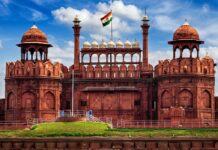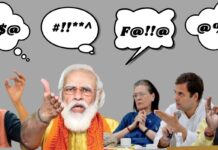Years ago, a commercial on TV channels portraying a simpleton named Pappu had become an instant hit among the audience. Being an overage candidate, his success in Class XII examination becomes a toast of everyone. So much so that, along with friends and well wishers, strangers join the celebration with chocolates bought from a shop on credit in his name. Hence, success, instead of joy, becomes a liability for him.
Perhaps taking a cue from this ad, someone slapped the “Pappu’ tag on Rahul. However, after grappling with this demeaning tag for a long time, “Pappu pass ho gaya” much to the consternation of those who gave him the sobriquet. His detractors do not seem to have anticipated that a person who they had dismissed as a nincompoop could one day make their lives hell by simply being a simpleton and with simple logic.
Rahul Gandhi’s transformation had started much early, when he realized the pappu tag was not as harmless as he had taken it to be. But it was accomplished only during the “Bharat Jodo Yatra”. Gone are the days when Arnab Goswami could tease him in his interview. Today, he has a mind of his own and makes no bones about expressing it. And that is what makes the BJP cry hoarse picking on everything he does or utters.
In this context, the hue and cry being raised over his speech at the University of Cambridge in the United Kingdom is the culmination of the saffron party’s tirade against the senior leader and former Congress president. While BJP leaders are tirelessly harping on an allegation that he spoke against the country on foreign soil, they are not quoting him verbatim, lest they would be exposing their own lie.
Firstly, it needs to be noted here that Rahul Gandhi’s visit to Cambridge was not a political event. He was invited by the university to deliver a lecture on contemporary Indian politics and economics. As such, it is unlikely that he would use the platform to make any controversial or inflammatory statements about India.
During his speech, Rahul Gandhi spoke about a range of issues, including India’s economic policies, its education system, and the role of technology in the country’s development. He also spoke about the need for India to address the issue of inequality and the importance of empowering the country’s youth.
He, of course, stated that democracy is under siege in his home country. Among the reasons he cited in support of his contention is that he is not allowed to speak in Parliament. An elected representative not allowed to speak in the highest forum of democracy is a serious issue for the country. It amounts to muzzling the voice of the people, and by extension, an assault on democracy itself. However, his statement could have been cross-checked to ascertain if Rahul has indeed spoken a lie. Only then he stands to be chastised for it, but not otherwise.
Of late, the ruling party and its leaders have assumed the role of self-appointed custodians of nationalism. They equate their party and their supreme leader, who happens to be the prime minister of the country, with the nation. To them, anything spoken against them or their leader is tantamount to blasphemy.
Rahul Gandhi today stands as a marked man for the BJP and its affiliate organizations. As in the game of soccer, several people in the party have been assigned with the task to trail and corner him in an ambush of sorts on anything he utters or he does.
As regards objections being raised against Rahul, it is important to note that criticism of a government and its policies cannot be the same as antinationalism. Constructive criticism is an essential part of any democratic society, and it is through such criticism that we can identify areas where we can improve. The Congress leader’s speech at Cambridge was an example of such criticism, and it should be welcomed as a sign of a healthy democracy.
Going back to his speech, at no point during his talk at the university did Rahul criticise the country or its policies. On the contrary, he expressed deep faith and reverence for India, calling it a “great country with enormous potential”. He acknowledged the country’s progress in certain areas, such as technology and innovation while highlighting the areas where he felt there was a scope for improvement.
Despite this, the rightwing saffron brigade lost no time in accusing Rahul of criticizing India while speaking on foreign soil. This accusation is baseless as there is no evidence to remotely suggest that he said anything derogatory about the country. In fact, his speech focused on constructive criticism, highlighting areas where India could improve rather than tearing it down.
By not allowing Parliament to function, the ruling party is negating the very point they want to make. Democracy is all about the right to speak, and this is exactly what Rahul Gandhi said. The Opposition’s voice is being muzzled, which is evident from their mics being turned off in the House, booed down, and portions of their speeches erased from the records of Parliament.
In fact, Rahul’s remarks in his speech at Cambridge are an example of constructive criticism, highlighting the areas where India could improve. And constructive criticism is an essential part of a healthy democracy. If the BJP and its supporters still insist on browbeating Rahul Gandhi for something he didn’t do, they should know that the public is keeping a close watch on all these goings-on and it can see through the game. By indulging in such negative activities the BJP government under Prime Minister Narendra Modi is only making self goal.
Mind it, Pappu is no longer the simpleton you knew. He has passed the test that you only had prescribed for him. He can beat you in your own game.
Disclaimer: We do undertake rigorous checks on content provided by contributors before publishing the same. If you come across some factual errors, kindly bring this into our notice and we shall review your objection and claim as per our policy and display correction credits and corrections on the article itself.
The opinion expressed in the article is of the writer. Writer is a freelance journalist/journalist based in Delhi





























